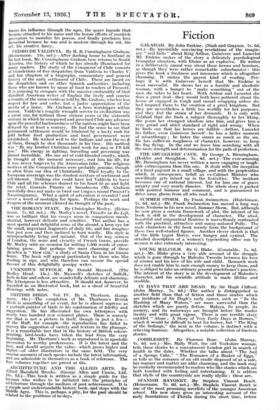l'EDRO DE VALDIVIA. By R. B. Cunninghame Graham.' (Heinemann. 15s.
net:)—After dashing home to Scotland in his last book, Mr. Cunninghame Graham here returns to South America, the history of which he has already illuminated for many readers. His study of the Conqueror of Chile consists of translations of five despatches from Valdivia to Charles V. and ten chapters of a biography, commentary and general history of the early settlement of Chile. These are based on' the despatches and on other Spanish authorities, including those who are known by name at least to readers of Prescott.' It is amusing to compare with the massive orotundity of that' dignified American writer of English the lively and concise accounts of the same events as told by Mr. Graham, who has less. respect for law and order, but a juster appreciation of the. merits of a horse. Mr. Graham is a hero worshipper within lesson. Valdivia's roughly wrought service to civilization was a great one, for without those sixteen years of the sixteenth century in which he conquered and governed Chile any advance" upon the peaceful backwardness of the natives might have been delayed by at least a century. He had the sense to see that permanent settlement would be hindered by a hasty rush for gold before food production and local government were established. He wished well to the Indians and saw the need' if them, though he slew thousands in his time. His method was Be my brother Christian (and work for •me) or I'll kill' iou." His energy in fighting, travelling and governing was' almost incredible. His one act of cold-blooded cruelty, which lie thought at the moment necessary, cost him his life, for it was never forgiven by the Araucanian tribe. The religious.,
Motives Of the Conquistadores were probably genuine, though so alien frith) our idea of Christianity. Their loyalty to the
European sovereign was the stoutest mixture of sentiment and self-interest. Nothing else could have led Valdivia to leave Chile and all the schemes dearest to his heart to go and fight the rebel, Gonzalo Pizarro at Sacsahuana '(Mr. Graham' mercifully does not make us twist our tongues round Preseott's Xaquixaguana). What a spirit of adventure is revealed ! and never a word of nostalgia for Spain. Perhaps the work and dangers of the moment allowed no thought of the past.














































 Previous page
Previous page